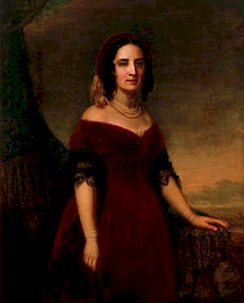|
 |

Part of the American
History & Genealogy Project |
Sarah Childress Polk 1803 ~ 1891


Sarah Childress Polk
Sarah Childress Polk, nee Childress, daughter of Captain Joel
and Elizabeth Childress was born near Murfreesboro, Tennessee,
September 4, 1803. She was educated at the Moravian Institute at
Salem, North Carolina. She was married at the age of nineteen to
James Knox Polk, of Murfreesboro. Mr. Polk was then a member of
the legislature of Tennessee and in the following year was
elected to Congress, and after serving on the most important
committees of the House of Representatives, he was elected
speaker, a position for which he was especially fitted,
Mrs. Polk accompanied her husband to Washington every winter and
occupied a prominent position in society. Her influence was not
only social, but political. She took great pains to inform
herself on political affairs, and was deeply interested in all
the discussions of the day which in any way affected the welfare
of her country.
She had lived all her life in the atmosphere of politics and had
extensive acquaintance with the public men of the time, and
often counseled with her husband on national subjects. They
resided at Columbia, Tennessee. She was a member of the
Presbyterian Church of that city and was much esteemed for her
devotion to her religious duties. Mrs. Polk was the recipient of
many testimonials of high esteem from distinguished men, among
them she received a copy of verses addressed to her by the
eminent jurist, Honorable Joseph D, Story. In 1839 Mr. Polk was
elected Governor of Tennessee and removed his residence to
Nashville.
Mrs. Polk as mistress of the executive mansion exercised a
powerful influence in harmonizing the bitterness which then
existed between rival parties. In the campaign of 1844, for the
Presidency, in which Henry Clay was the idol of the Whig party,
and James K. Polk of the Democratic Party, there was the
greatest excitement. Mr. Polk was elected and inaugurated on
March 4, 1845. Having no children, Mrs. Polk devoted all her
time to her duties as Lady of the White House, and no other
mistress of that stately mansion left a more favorable
impression upon the people and society of that day than did Mrs.
Polk. It may be said that she maintained the dignity of the
President's mansion without assuming the slightest hauteur and
much has been said of her attractive manner, queenly bearing and
sincere cordiality. The receptions of President and Mrs. Polk
were very largely attended and universally enjoyed. Her style of
dress was particularly becoming to her.
She had very black hair and eyes and a fair complexion and was
much given to wearing bright colors and gay turbans. It was with
much regret that the social circles of Washington saw Mr. and
Mrs. Polk depart from the White House. It was during Polk's
administration that we had the war with Mexico and much credit
is due to the President and Mrs. Polk in causing the settlement
of the difficulties between the United States and Mexico.
Mr. Polk, on his retirement from the White House, purchased a
house in Nashville, Tennessee, but did not live long in
enjoyment of it. After his death Mrs. Polk lived a great many
years in this Nashville home, receiving here the homage of all
distinguished visitors to the capital of Tennessee. The
legislature of that state called upon her in a body every New
Year's Day when they were in session.
During the confederate days of Nashville, Mrs. Polk received the
most distinguished consideration, all general officers, both
Confederate and Union, paying their respects to her by calling
in person. The writer remembers hearing George Bancroft, the
distinguished historian, give a graphic account of his charming
visit to Mrs. Polk not long before her death, which occurred in
1891.
Women of
America

Source: The Part Taken by Women in
American History, By Mrs. John A. Logan, Published by The Perry-Nalle
Publishing Company, Wilmington, Delaware, 1912.
|